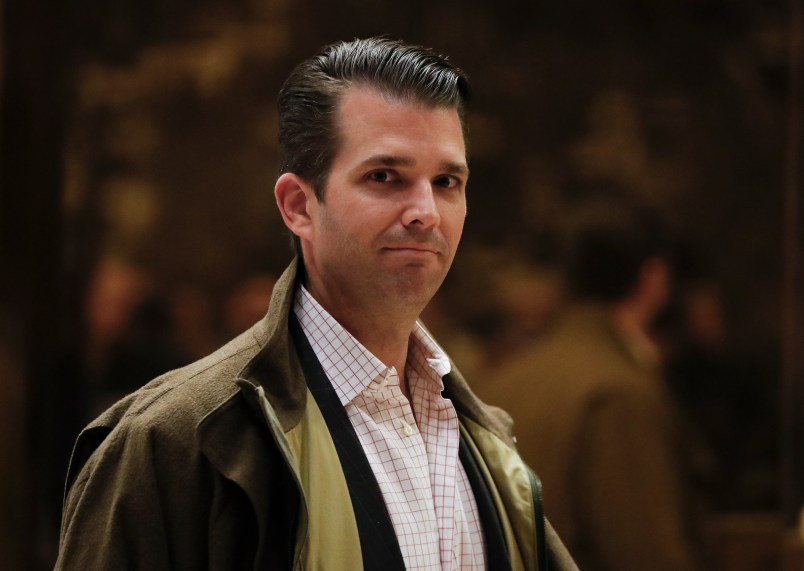Rep. Adam Schiff (D-CA), the ranking member on the House Intelligence Committee, told reporters on Wednesday evening that Donald Trump Jr. cited attorney-client privilege to avoid answering the committee’s questions about a discussion he had with President Donald Trump about his June 2016 meeting with Kremlin-linked officials.
After the committee completed its interview with Trump Jr., Schiff briefly spoke with reporters and revealed that Trump Jr. acknowledged that he discussed the June 2016 meeting, as well as the emails leading up to the meeting, with his father. Schiff said that the conversation “ostensibly” took place after the emails became public but would not reveal more about the timeline.
Trump Jr. told committee members that lawyers were present for his conversation with the President and argued that this shields him from having to detail the discussion with the committee, per Schiff.
Schiff disagreed, however.
“I don’t believe you can shield communications between individuals merely by having an attorney present,” he told reporters. “That’s not the purpose of attorney-client privilege.”
Trump Jr., along with other campaign officials, met with a Kremlin-linked lawyer in June 2016 after he was promised that the lawyer had incriminating information on Hillary Clinton.
When the New York Times first reported on the meeting in July 2017, Trump Jr. claimed that it was merely an “introductory” meeting to discuss adoption of Russian children in the U.S. President Donald Trump and White House advisers reportedly helped craft that initial statement that left out key details about the meeting.
As the Times continued its reporting on the email, Trump Jr. released two additional statements over the course of a few days. In the second statement, he acknowledged that the Kremlin-linked lawyer told him that she had damaging information on Clinton in the meeting, but Trump Jr. did not reveal in that statement that he was promised this information in an email scheduling the meeting. Finally, he released the emails that showed he was promised the information three days after the initial New York Times report.







I’ve searched and searched U. S. Code. Can’t find any mention of Dim Son Privilege.
“And there was a Russian lawyer in New York, so I’m not gonna talk about those meetings either!”
The “I don’t want to answer those questions” privilege now comes in another form. First, there was the Sessions’ “the president might want to claim executive privilege at a later date” excuse. Now, Junior comes up with a novel and incorrect interpretation of the well-established attorney-client privilege. And the Republicans on the committees go along with any excuse not to answer and will not demand answers (because the Republicans don’t want that info out there either). Might as well say, “My reason for not answering is wicky-wicky-wongtooth-throat-warbler-mangro,” and that’ll be just fine with the Republicans.
And I suppose Reince is Eric’s gynecologist.
https://www.huffingtonpost.com/jacob-m-appel/dr-coburns-peculiar-privi_b_308077.html
Don’t confidentiality rules specifically work the opposite way? If I am with my lawyer, and an unrelated party joins us, then privilege ends.
Otherwise, criminal conspiracies can be hidden by this mechanism.